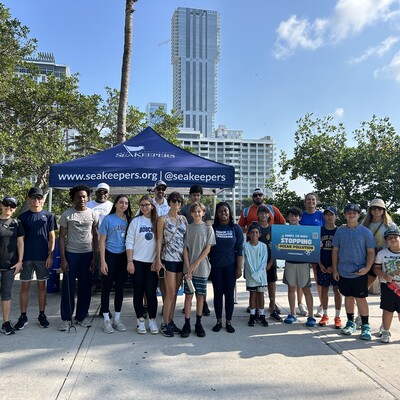SeaKeepers Monthly Margaret Pace Cleanup
Miami, Florida
May 11, 2024
Overview
On Saturday, May 11, 2024, The International SeaKeepers Society returned to Margaret Pace Park to host a cleanup. We were not able to host a cleanup here this April, and the park was desperately in need of cleaning! We were joined by 19 volunteers who got to work after a safety and instructional briefing, scouring the entire park for debris. Lots of trash can always be found in the grass of the park and between the rocks and mangrove roots on the shoreline, and our volunteers got down and dirty picking up whatever they could reach. While collecting trash, we noticed a dolphin swimming in the bay, which reminds us of the importance of preventing trash from becoming marine debris, which can threaten the livelihood of our resident marine animals. In just two hours, our volunteers brought back countless bags and buckets full of trash, resulting in over 101 pounds of trash removed. Data collected using Marine Debris Tracker told us that the most commonly picked-up items were plastic fragments, bottle caps and bags. We are grateful to all the volunteers and their hard work, and we look forward to returning to Margaret Pace Park in July!
Marine Debris Tracker is a data collection app that allows the general public to contribute to an open-date platform and scientific research by recording the different types of litter, specifically plastic pollution, that they find in either inland or marine environments. Marine Debris Tracker was developed by the University of Georgia’s Jambeck Research Group, which SeaKeepers worked with in 2021 when the Jambeck Research Group collaborated with Ocean Conservancy to assess Miami’s plastic waste management, known as a Circularity Assessment Protocol. SeaKeepers again assisted the Jambeck Research Group’s Circularity Informatics Lab in 2022 with another Circularity Assessment Protocol in the Florida Keys. The researchers of the Jambeck Lab use the Marine Debris Tracker app to record their data, and with citizen scientists also using the app, more data can be collected in different areas. Using Marine Debris Tracker at our cleanups involves community members in creating a bigger picture of plastic pollution, and provides the means for new scientific findings to be generated as well as for effective local legislation to be informed. SeaKeepers is excited to be incorporating this app at our cleanups and continue our mission of coastal education, protection, and restoration. In this cleanup, 63% of volunteers participated in using the app to record data.


You must be logged in to post a comment.